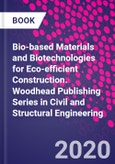Bio-based Materials and Biotechnologies for Eco-efficient Construction fills a gap in the published literature, discussing bio-based materials and biotechnologies that are crucial for a more sustainable construction industry. With comprehensive coverage and contributions from leading experts in the field, the book includes sections on Bio-based materials and biotechnologies for infrastructure applications, Bio-based materials and biotechnologies for building energy efficiency, and other applications, such as using biotechnology to reduce indoor air pollution, for water treatment, and in soil decontamination. The book will be an essential reference resource for academic researchers, civil engineers, contractors working in construction works, postgraduate students and other professionals.
Please Note: This is an On Demand product, delivery may take up to 11 working days after payment has been received.
Table of Contents
1. Introduction to bio-based materials and biotechnologies for eco-efficient construction
PART I BIO-BASED MATERIALS AND BIOTECHNOLOGIES FOR INFRASTRUCTURE APPLICATIONS 2. Sustainable carbohydrate-derived building materials 3. Biobased Polymers for Mitigating Early- and Late-Age Cracking in Concrete 4. Influence of two commercial superplasticizers and a biopolymer on the performance of waste based alkali-activated mortars 5. Fire-retardant bioproducts for green buildings 6. Properties of bio-asphalt derived from castor oil
PART II BIO-BASED MATERIALS AND BIOTECHNOLOGIES FOR BUILDING ENERGY EFFICIENCY 7. Building insulation materials based on agricultural wastes 8. Bio-based insulation materials performance in an old building envelope system 9. Tilia sp.'s pruning residues wood panels for thermal insulation 10. Properties of clayey plasters with olive fibers 11. Thermal insulation biomaterial base on Hydrangea macrophylla 12. Bio-based phase change materials 13. Building integrated photobioreactor
PART III BIO-BASED MATERIALS AND BIOTECHNOLOGIES FOR OTHER APPLICATIONS 14. Biotechnology for soil decontamination 15. Botanical biofiltration for reducing indoor air pollution 16. Cellulose-TiO2 composites for the removal of water pollutants 17. Environmental safety of biotechnological materials and processes 18. Biotechnology for immobilization of chemical, biological and radioactive pollutants on land and infrastructure demolition waste after industrial accident or terroristic attack








